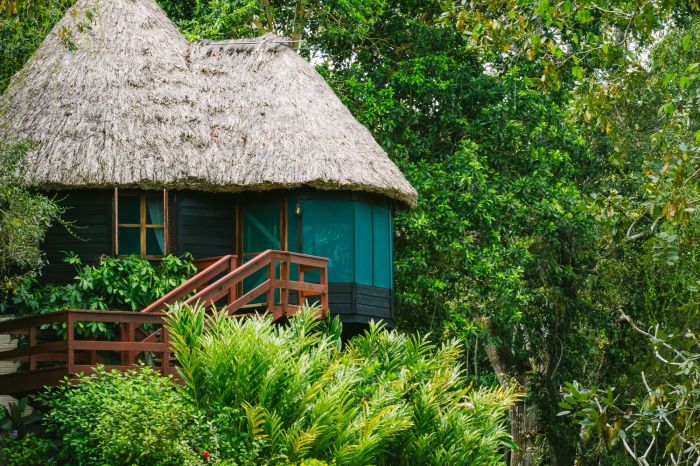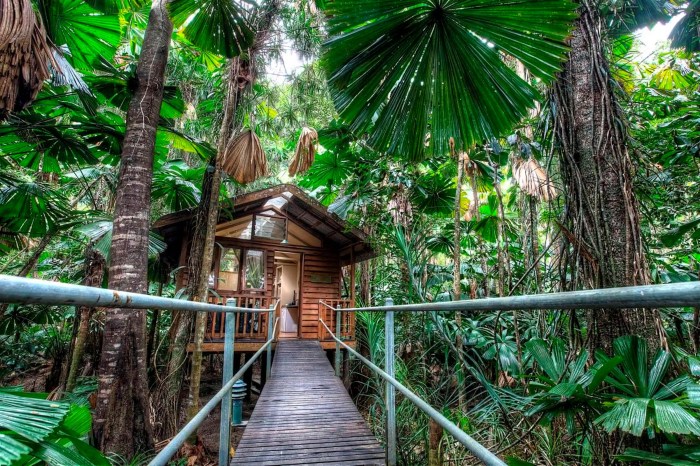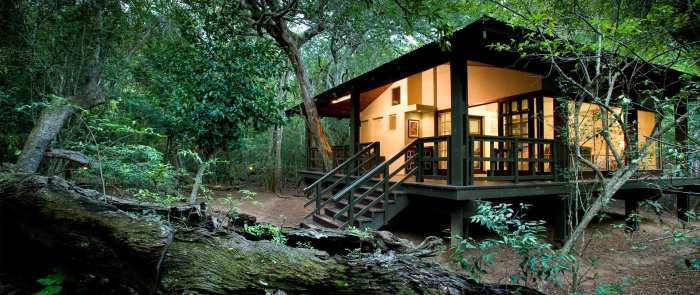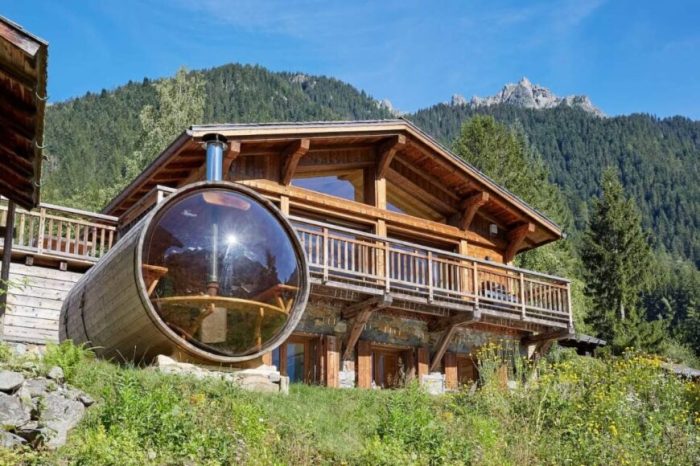Eco-lodges, havens of sustainable tourism, are meticulously designed to minimize their ecological footprint while immersing guests in nature’s embrace. Their commitment to environmental preservation, cultural sensitivity, and community involvement sets them apart as responsible stewards of the planet.
From the use of renewable energy sources to the promotion of local heritage, eco-lodges are beacons of sustainable practices. They offer unique experiences, such as wildlife viewing and educational programs, that foster a deep appreciation for the natural world.
Definition and Overview

Eco-lodges are sustainable accommodations that prioritize environmental conservation and cultural preservation while providing a unique and immersive travel experience for guests.
They play a crucial role in sustainable tourism by promoting responsible travel practices, supporting local communities, and protecting natural ecosystems.
Key Characteristics
- Minimal environmental impact: Eco-lodges are designed and operated to minimize their ecological footprint, using renewable energy sources, sustainable building materials, and water conservation measures.
- Respect for local culture: Eco-lodges engage with local communities, preserving and promoting traditional practices, arts, and customs.
- Education and awareness: They provide educational programs and activities for guests, fostering environmental awareness and responsible travel practices.
- Community involvement: Eco-lodges create economic opportunities for local communities through employment, training, and fair trade initiatives.
Environmental Impact and Sustainability

Eco-lodges prioritize minimizing their ecological footprint through a range of environmental practices and initiatives.
They implement measures to conserve energy, water, and natural resources, ensuring a harmonious coexistence with the surrounding environment.
Eco-lodges, with their emphasis on sustainability and immersion in nature, offer a unique way to experience the outdoors. For those seeking adventure, they can serve as a base for extreme sports vacations , providing access to thrilling activities like rock climbing, zip-lining, and white-water rafting.
After an exhilarating day of adventure, eco-lodges offer a tranquil retreat where guests can relax, recharge, and reconnect with the natural world.
Energy Conservation
- Employ renewable energy sources such as solar panels, wind turbines, and geothermal heating.
- Utilize energy-efficient appliances, lighting, and building materials to reduce energy consumption.
- Implement passive design strategies like natural ventilation and insulation to minimize energy usage.
Water Conservation
- Install rainwater harvesting systems to collect and store rainwater for non-potable uses.
- Use low-flow fixtures and appliances to reduce water consumption.
- Implement water-saving practices such as drip irrigation and mulching to conserve water resources.
Natural Resource Conservation
- Use sustainable building materials like bamboo, recycled wood, and local materials to minimize environmental impact.
- Reduce waste generation through recycling, composting, and responsible waste management practices.
- Promote responsible use of resources by educating guests on eco-friendly practices.
Biodiversity Conservation and Habitat Protection
Eco-lodges actively contribute to biodiversity conservation and habitat protection by:
- Protecting and restoring natural habitats, creating corridors for wildlife movement.
- Planting native vegetation and supporting local ecosystems.
- Educating guests about the importance of biodiversity and responsible tourism practices.
Cultural and Social Responsibility

Eco-lodges play a crucial role in fostering cultural sensitivity and community involvement. By respecting local traditions, supporting local economies, and promoting cultural heritage, eco-lodges can create positive relationships with surrounding communities.
Cultural sensitivity involves understanding and respecting local customs, beliefs, and practices. Eco-lodges can achieve this by hiring local staff, using local materials, and incorporating traditional designs into their architecture. This helps preserve cultural heritage while providing employment opportunities for the community.
Community Involvement
Eco-lodges can actively engage with local communities by supporting local businesses, purchasing goods and services from local suppliers, and involving community members in decision-making processes. This creates economic opportunities and fosters a sense of ownership and pride in the eco-lodge.
When planning your next adventure, consider booking an eco-lodge to minimize your environmental impact. These accommodations prioritize sustainable practices, offering an immersive experience in nature. To further enhance your eco-conscious journey, explore eco-friendly travel tips that range from packing light to supporting local communities.
By embracing eco-lodges and implementing these tips, you can enjoy unforgettable travels while leaving a positive footprint on the planet.
Cultural Heritage Promotion
Eco-lodges can promote cultural heritage by offering guided tours, workshops, and cultural experiences that showcase local traditions and history. This helps educate guests about the local culture and generates revenue for community-based cultural initiatives.
Guest Experience and Amenities
Eco-lodges offer a unique blend of nature-based experiences and amenities, catering to the needs of eco-conscious travelers. These experiences and amenities are designed to minimize environmental impact while providing a comfortable and immersive stay for guests.
Eco-lodges offer a range of nature-based activities, such as guided hikes, wildlife viewing, and kayaking. These activities allow guests to connect with the natural surroundings and learn about the local ecosystem. Many eco-lodges also have educational programs that teach guests about sustainable practices and the importance of conservation.
Eco-Conscious Amenities
Eco-lodges cater to the needs of eco-conscious travelers by providing amenities that minimize environmental impact. These amenities include energy-efficient appliances, low-flow plumbing fixtures, and biodegradable cleaning products. Some eco-lodges also offer composting toilets and rainwater harvesting systems to further reduce their environmental footprint.
Comfortable and Sustainable Accommodations
Eco-lodges provide comfortable and sustainable accommodations that blend with the natural surroundings. These accommodations often use sustainable building materials, such as recycled wood and bamboo, and feature energy-efficient lighting and heating systems. Many eco-lodges also offer eco-friendly toiletries and linens to further reduce their environmental impact.
Design and Architecture: Eco-lodges

Eco-lodges prioritize sustainability in their design and architecture, blending seamlessly into their natural surroundings. Sustainable design principles guide the construction of these lodges, minimizing their environmental impact and promoting harmony with nature.
Eco-lodges employ eco-friendly materials, renewable energy sources, and innovative building techniques to create structures that are both functional and environmentally responsible. They often incorporate local materials and traditional building practices to minimize their carbon footprint and support local communities.
Eco-Friendly Materials, Eco-lodges
- Wood from sustainably managed forests
- Recycled materials
- Bamboo and other renewable resources
Renewable Energy Sources
- Solar panels
- Wind turbines
- Hydroelectric systems
Innovative Building Techniques
- Passive solar design
- Natural ventilation
- Green roofs and living walls
Case Studies and Examples
To illustrate the successful implementation of eco-lodge principles, we present case studies of renowned eco-lodges worldwide, showcasing their innovative approaches to sustainability, cultural sensitivity, and guest experience.
These examples demonstrate the positive impacts eco-lodges can have on their local environments and communities, fostering conservation, economic development, and cultural preservation.
Inkaterra Reserva Amazonica, Peru
Nestled in the heart of the Peruvian Amazon rainforest, Inkaterra Reserva Amazonica has pioneered sustainable tourism practices for over three decades. Its eco-friendly lodges blend seamlessly into the surrounding ecosystem, minimizing environmental impact while offering guests an immersive rainforest experience.
The lodge’s design incorporates local materials and traditional construction techniques, respecting the region’s cultural heritage. Inkaterra’s commitment to conservation extends to its reforestation efforts, planting over 25,000 trees annually to restore degraded areas.
Eco-lodges are an excellent option for those seeking a sustainable and immersive travel experience. These lodges often offer unique opportunities to explore local ecosystems and support conservation efforts. While scuba diving enthusiasts may be drawn to renowned scuba diving locations , eco-lodges provide an opportunity to combine their passion for underwater exploration with a commitment to environmental stewardship.
Fogo Island Inn, Canada
Perched on a rugged coastline in Newfoundland, Canada, Fogo Island Inn is a testament to sustainable architecture and community engagement. The inn’s striking contemporary design was inspired by the traditional fishing stages of the region, showcasing the area’s cultural identity.
Fogo Island Inn’s commitment to social responsibility is evident in its employment practices, prioritizing local hires and supporting community initiatives. The inn has played a pivotal role in revitalizing the island’s economy, creating jobs and attracting tourism.
Grootbos Private Nature Reserve, South Africa
Situated in the Western Cape of South Africa, Grootbos Private Nature Reserve is renowned for its conservation efforts and eco-friendly practices. The reserve encompasses diverse ecosystems, including fynbos, wetlands, and coastal dunes, and is home to a wide variety of wildlife.
Grootbos’s eco-lodges are designed to minimize their carbon footprint, utilizing renewable energy sources and sustainable building materials. The reserve’s commitment to community empowerment is reflected in its educational programs and partnerships with local communities.
Challenges and Opportunities
Balancing sustainability with economic viability is a significant challenge for eco-lodges. They must operate sustainably while maintaining profitability to continue their operations and achieve their conservation goals. Additionally, the industry faces challenges in managing waste, reducing carbon emissions, and sourcing sustainable materials.
Despite these challenges, there are opportunities for growth and innovation in the eco-lodge industry. The increasing demand for sustainable tourism creates a market for eco-lodges. Eco-lodges can differentiate themselves by offering unique experiences that align with travelers’ values. Technology can enhance sustainability by optimizing energy usage, reducing waste, and improving guest engagement. Partnerships with local communities and conservation organizations can create mutually beneficial relationships that support sustainable practices and social impact.
Role of Technology and Partnerships
Technology can play a crucial role in enhancing the sustainability and impact of eco-lodges. Smart energy systems, water conservation technologies, and waste management solutions can help reduce environmental impact. Digital platforms can facilitate guest education, promote conservation efforts, and connect with local communities.
Partnerships with local communities and conservation organizations can create synergies that support sustainable practices and social impact. Local communities can provide insights into cultural traditions, sustainable practices, and conservation efforts. Conservation organizations can offer expertise in wildlife management, habitat restoration, and environmental monitoring.
Conclusion

Eco-lodges play a crucial role in promoting sustainable tourism by minimizing environmental impact, preserving cultural heritage, and enhancing the guest experience. Their commitment to responsible practices sets a positive example for the tourism industry and contributes to the protection and conservation of natural and cultural resources.
Future research and development in the eco-lodge sector should focus on:
- Developing innovative technologies and construction methods to further reduce environmental impact.
- Exploring new models for community involvement and benefit sharing.
- Promoting education and awareness about the importance of sustainable tourism practices.
- Establishing industry-wide standards and certifications to ensure the credibility and consistency of eco-lodge operations.
Summary
Eco-lodges stand as testaments to the harmonious coexistence of tourism and environmental conservation. Their innovative approaches and unwavering dedication to sustainability provide a roadmap for the future of responsible travel. As the demand for eco-friendly experiences grows, eco-lodges will continue to play a vital role in promoting sustainable tourism practices and preserving the delicate balance of our planet.
FAQ Guide
What are the key features of eco-lodges?
Eco-lodges prioritize environmental sustainability, cultural sensitivity, and community involvement. They employ eco-friendly practices, use renewable energy sources, and actively engage with local communities.
How do eco-lodges contribute to biodiversity conservation?
Eco-lodges often establish protected areas and implement measures to minimize their impact on wildlife. They support local conservation efforts and promote responsible tourism practices that protect biodiversity.
What are the benefits of staying in an eco-lodge?
Eco-lodges offer a unique opportunity to connect with nature while supporting sustainable practices. Guests can enjoy nature-based activities, learn about local cultures, and contribute to the preservation of fragile ecosystems.